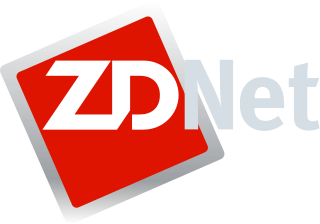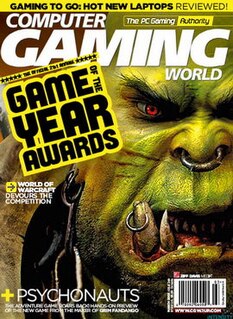Related Research Articles

The IBM PCjr was a home computer produced and marketed by IBM from March 1984 to May 1985, intended as a lower-cost variant of the IBM PC with hardware capabilities better suited for video games, in order to compete more directly with other home computers such as the Apple II and Commodore 64.

Ziff Davis, Inc., known as Ziff Davis, is an American internet and digital media company. Ziff Davis's current subsidiaries operate in digital media, affiliate marketing, video game and software sectors. Among Ziff Davis's business units are gaming and entertainment platform IGN, coupon aggregator RetailMeNot, digital storefront and gaming publisher Humble Bundle, broadband service Speedtest.net and many others.

ZDNet is a business technology news website owned and operated by Red Ventures. The brand was founded on April 1, 1991, as a general interest technology portal from Ziff Davis and evolved into an enterprise IT-focused online publication.

Turok: Dinosaur Hunter is a first-person shooter video game developed by Iguana Entertainment and published by Acclaim for the Nintendo 64 console and Microsoft Windows. It was released in 1997 in North America and Europe. Turok is an adaptation of the Acclaim Comics comic book series of the same name. The player controls Turok, a Native American warrior, who must stop the evil Campaigner from conquering the universe with an ancient and powerful weapon.

Computer Gaming World (CGW) was an American computer game magazine published between 1981 and 2006. One of the few magazines of the era to survive the video game crash of 1983, it was sold to Ziff Davis in 1993. It expanded greatly through the 1990s and became one of the largest dedicated video game magazines, reaching around 500 pages by 1997.

Popular Electronics was an American magazine published by John August Media, LLC, and hosted at TechnicaCuriosa.com. The magazine was started by Ziff-Davis Publishing Company in October 1954 for electronics hobbyists and experimenters. It soon became the "World's Largest-Selling Electronics Magazine". In April 1957 Ziff-Davis reported an average net paid circulation of 240,151 copies. Popular Electronics was published until October 1982 when, in November 1982, Ziff-Davis launched a successor magazine, Computers & Electronics. During its last year of publication by Ziff-Davis, Popular Electronics reported an average monthly circulation of 409,344 copies. The title was sold to Gernsback Publications, and their Hands-On Electronics magazine was renamed to Popular Electronics in February 1989, and published until December 1999. The Popular Electronics trademark was then acquired by John August Media, who revived the magazine, the digital edition of which is hosted at TechnicaCuriosa.com, along with sister titles, Mechanix Illustrated and Popular Astronomy.

Compute!, often stylized as COMPUTE!, was an American home computer magazine that was published from 1979 to 1994. Its origins can be traced to 1978 in Len Lindsay's PET Gazette, one of the first magazines for the Commodore PET computer. In its 1980s heyday Compute! covered all major platforms, and several single-platform spinoffs of the magazine were launched. The most successful of these was Compute!'s Gazette, which catered to VIC-20 and Commodore 64 computer users.

PC Magazine is an American computer magazine published by Ziff Davis. A print edition was published from 1982 to January 2009. Publication of online editions started in late 1994 and continues to this day.

eWeek, formerly PCWeek, is a technology and business magazine. Previously owned by QuinStreet; Nashville, Tennessee marketing company TechnologyAdvice acquired eWeek in 2020.

FamilyPC was a monthly American computer magazine published from 1994 to 2001. The collaboration between The Disney Publishing Group and Ziff-Davis was a brainchild of Jake Winebaum, with Robin Raskin serving as its first editor-in-chief. The circulation of the magazine was 400,000 copies in 1998.
Windows Sources was a magazine by ZDNet. It focused on product reviews rather than 'how to,' and it lasted from 1993 – c. 2001.

William Bernard "Bill" Ziff Jr. was an American publishing executive. His father, William Bernard Ziff Sr., was the co-founder of Ziff Davis Inc. and when the elder Ziff died in 1953, Ziff took over the management of the company. After buying out partner Bernard G. Davis, he led Ziff Davis to become the most successful publisher of technology magazines in the 1970s and 1980s.

CNET, stylised C|net, is an American media website that publishes reviews, news, articles, blogs, podcasts, and videos on technology and consumer electronics globally, owned by Red Ventures since 2020. Founded in 1994 by Halsey Minor and Shelby Bonnie, it was the flagship brand of CNET Networks and became a brand of CBS Interactive through that unit's acquisition of CNET Networks in 2008, which was the previous owner prior to October 30, 2020. CNET originally produced content for radio and television in addition to its website and now uses new media distribution methods through its Internet television network, CNET Video, and its podcast and blog networks.

Frederic Emery Davis, known as Fred Davis, is a veteran US technology writer and publisher who served as editor of A+'' magazine, MacUser, PC Magazine and PC Week; personal computer pioneer; technologist; and entrepreneur involved in the startups of Wired, CNET, Ask Jeeves, Lumeria, Jaduka, and Grabbit.

Byte was a microcomputer magazine, influential in the late 1970s and throughout the 1980s because of its wide-ranging editorial coverage.

The LTE Lite was a series of notebook-sized laptops under the LTE line manufactured by Compaq from 1992 to 1994. The first entries in the series were Compaq's first computers after co-founder Rod Canion's ousting and Eckhard Pfeiffer's tenure as the new CEO. The notebooks were co-developed and manufactured by Compaq and Citizen Watch of Japan. They were a hot-seller for Compaq and spanned multiple models, with various processors and liquid-crystal display technologies.

The Palm Top PC 110 is a handheld personal computer that was developed jointly by IBM's Japanese subsidiary and Ricoh. It was released exclusively in Japan in September 1995. It used the Intel 80486SX microprocessor and was available in three different configurations. It used a Japanese keyboard, could be used in a docking station, and had a modem connection. During the development phase, the size was decreased. After the release, it was received positively for the number of features, but negatively for the small keyboard.
Digital Review was a trade magazine focusing on the market created by Digital Equipment Corporation (DEC), at the time the second largest computer company; IBM was number one.
Canon Computer Systems, Inc. (CCSI), sometimes shortened to Canon Computer, was an American subsidiary of Canon Inc. formed in 1992 to develop and market the parent company's personal computers and workstations. The subsidiary also assumed the responsibility of marketing Canon's printers and photocopiers, which were formerly sold by other Canon divisions. It went defunct in January 2001.

DTK Computer is the name for international branches of Datatech Enterprises, a Taiwanese computer manufacturer. Founded in 1981, the company was an early supplier of peripherals for IBM PCs as well as PC compatible motherboards. In the late 1980s, the company switched to developing complete systems under the DTK name as well as serving as an OEM for motherboards and cases, as bought by other small computer companies and systems integrators. The company was little-known in its own time but performed well in the marketplace. DTK was the 10th and 11th biggest personal computer manufacturer in the world in 1991 and 1992 respectively, according to Electronics magazine.
References
- 1 2 3 Trip Gabriel (September 4, 1994). "Gurus of Multimedia Gulch". The New York Times .
- 1 2 3 4 David Barboza (January 23, 1996). "Computer magazines are proliferating, but advertisers are looking elsewhere, too". The New York Times .
- ↑ David Hochman (June 27, 1994). "New Magazine Choices For Families With PC's". The New York Times .
- ↑ Laurence Zuckerman (October 23, 1995). "Is Time Right For Purchase Of Ziff-Davis?". The New York Times .
- ↑ Equip "Soft Spots Appear, Revenues Up 5.9% After A Stellar '97". Advertising Age . June 14, 1999.